First, thanks so much to those of you who have lifted my blogging spirits lately with encouraging and even appreciative comments — and especially to those who have bought me a coffee (or even Five! Wow, thank you!)
I’m writing another post right now, and I’d intended to post it today, but it’s posing some challenges. I’m trying to be honest and reflective and clear without getting too tangled up in awkward feelings (also, trying not to think of my thoughts and feelings as “awkward,” but to observe them with curiosity rather than judgment). Since that is taking even more editing and deleting than I’d anticipated, I’m going to offer you something else today, and publish the other later in the week.
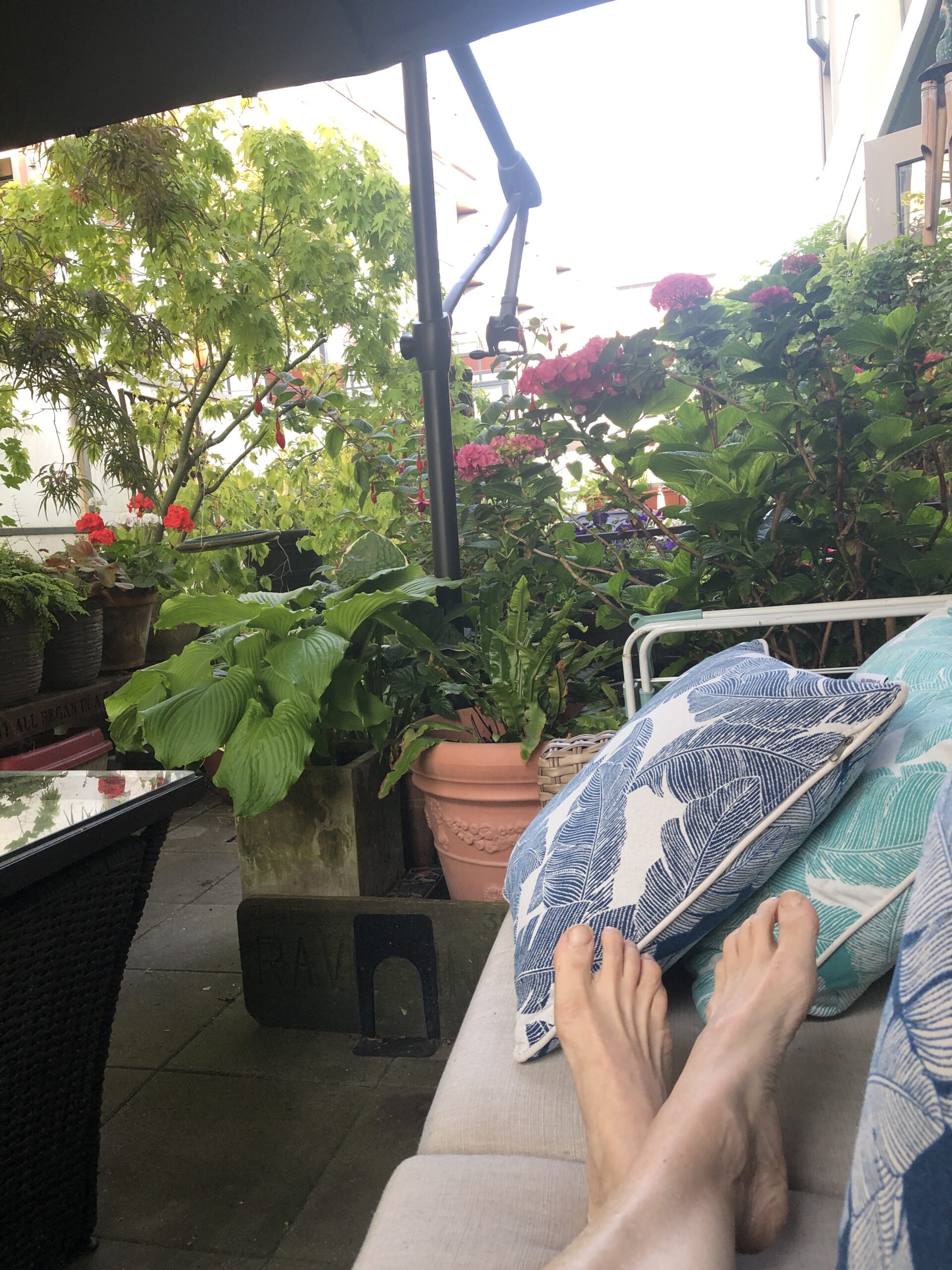
Today’s “something else”: a little story connecting the generations and then a quick update — with photos I’ve been collecting the past week — a bit of a “photo dump,” in fact — of our garden.
First, the little story. It started last week when I was chatting with my grandchildren, and the Five interrupted for some clarification: “What’s a penny?” He and his older sister both have piggy banks and allowances and a growing familiarity with what you can buy with a loonie or two (Canada’s dollar coin has an image of a loon on one side; hence, a “loonie”). But surprised as I first was at his numismatic ignorance, I quickly realized that both kids were born after 2013, the year in which the Royal Canadian Mint stopped producing pennies, and every year since there’ve been fewer and fewer of them in circulation (Yes, they’re still legal tender, and yes, prices can still include numbers that don’t end in .5 or .0, but we “round up or down,” depending. And our pockets and wallets last longer.)
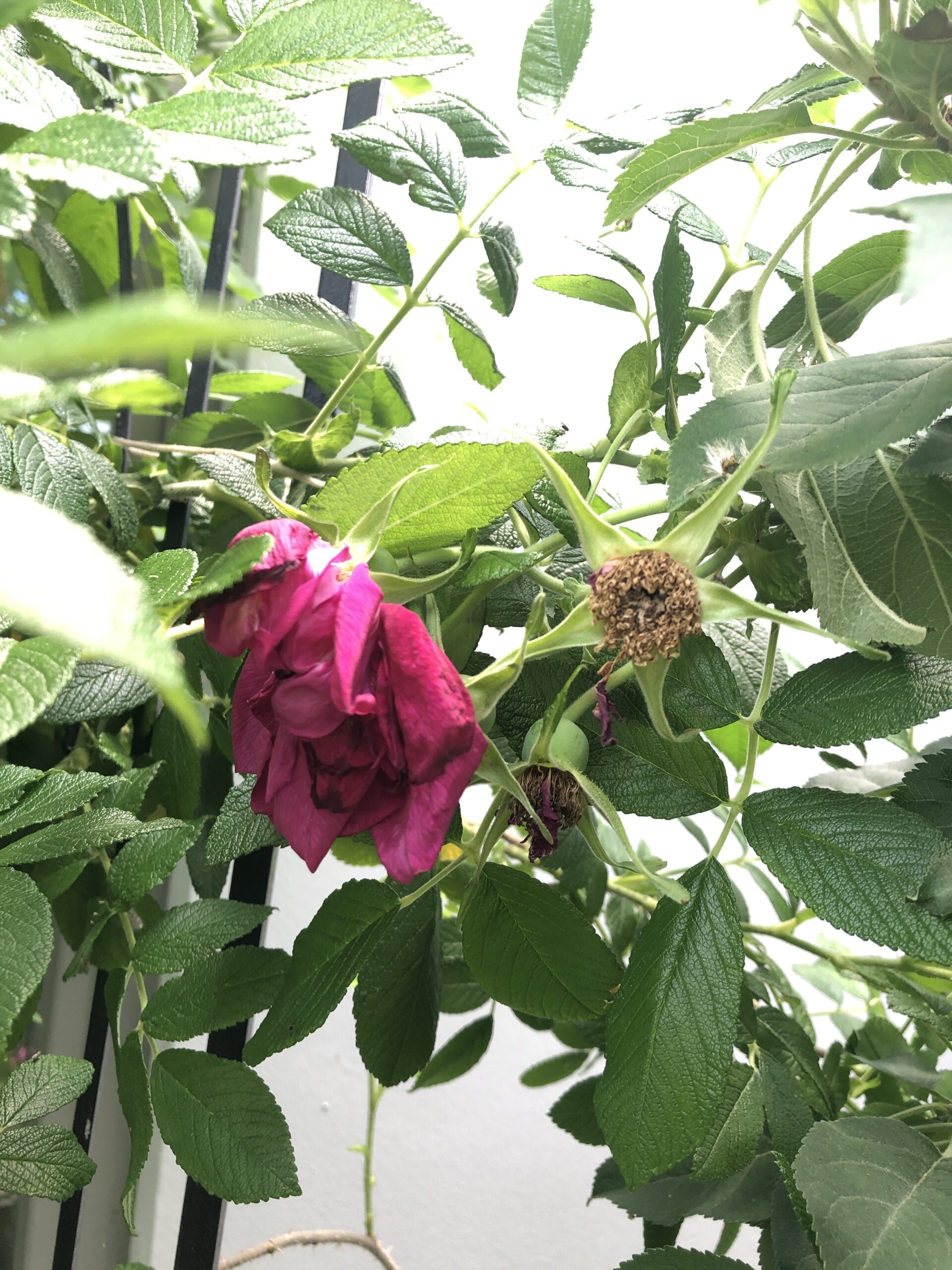
So I explained what pennies were, and I told him how much candy we could buy with one when I was his age, or his sister’s, particularly at the little corner shop nestled in our residential area (a Chinese-Canadian family owned it and lived in the back, typical for the era). We’d stop, sometimes, on the way to our neighbourhood playground, my siblings and I, if we’d collected a couple of pennies. We weren’t often allowed to, but sometimes we did anyway, tacitly agreeing not to tell — and we’d come out of that crowded little shop happily wearing a candy necklace or chewing on a huge jawbreaker, popping it out of our mouths regularly to check on the colour changes. Perhaps you did the same?
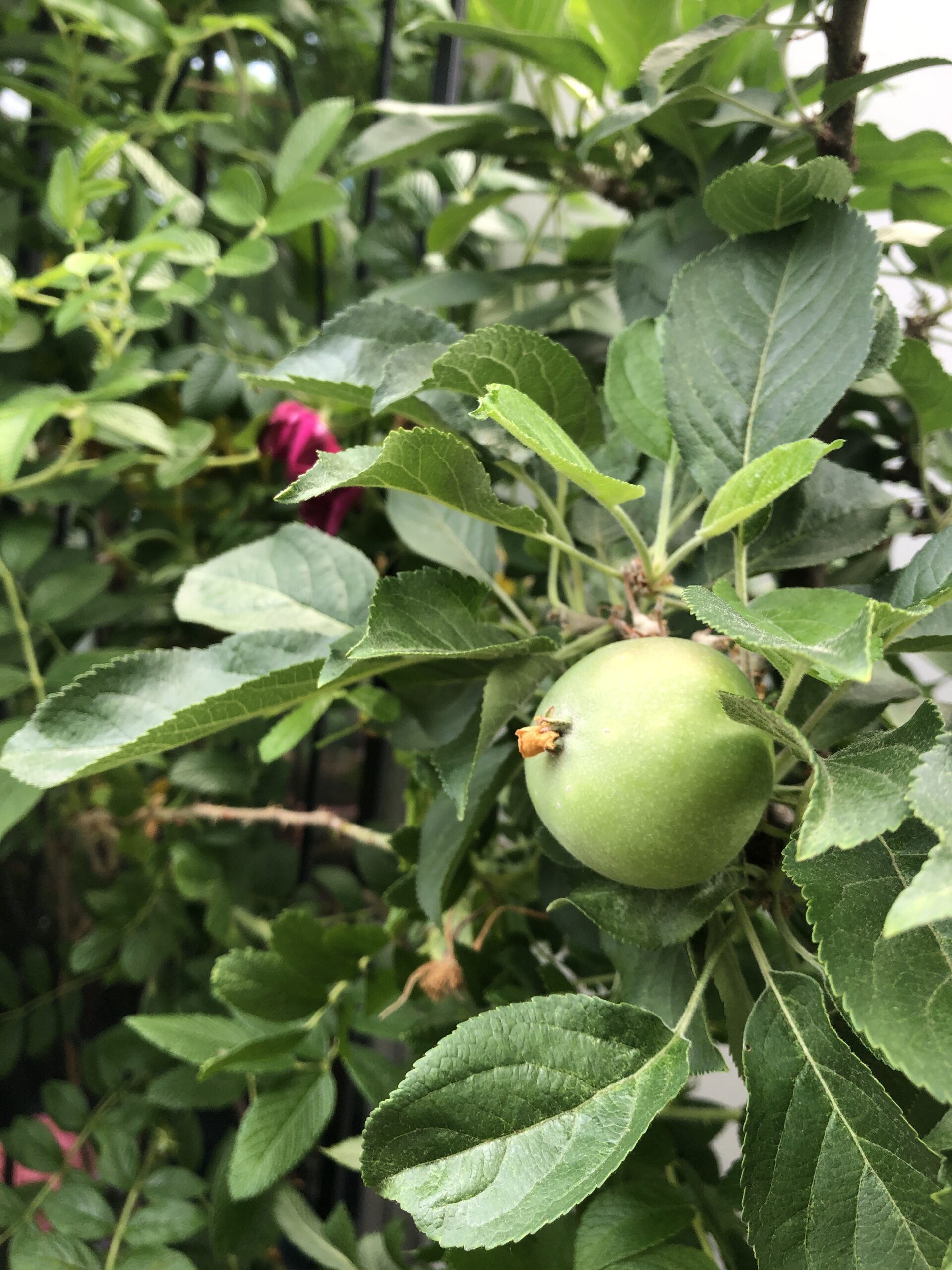
Somehow, this recognition of how much has changed since my childhood, such that the term “penny candy,” once widely used, no longer has any currency (ahem, excuse or applaud the pun, as you will), somehow this recognition reminded me of a sweet anecdote concerning my English grandmother. The incident took place in London, in 1971. My younger sister and I were visiting our aunt before heading up to northern Yorkshire to stay with our grandmother. I’d spent time with my grandmother before, when I was 2, 4, 13, and then 14 when I’d travelled to England on my own. I have an archive of warm memories of her, mostly fleeting and impressionistic ones, as you might expect. (You can see a 1966 photo of us together in Vancouver and read a bit more about our relationship in this post from a few years ago.)
But it’s an anecdote that my London aunt recounted during that 1971 visit that I most often think of, one that can still make me chuckle. 1971 was the year that Great Britain shifted to the decimal system, a move exponentially more dramatic and challenging than the 2013 move to relieve Canadian wallets and cash registers of our little copper coins.
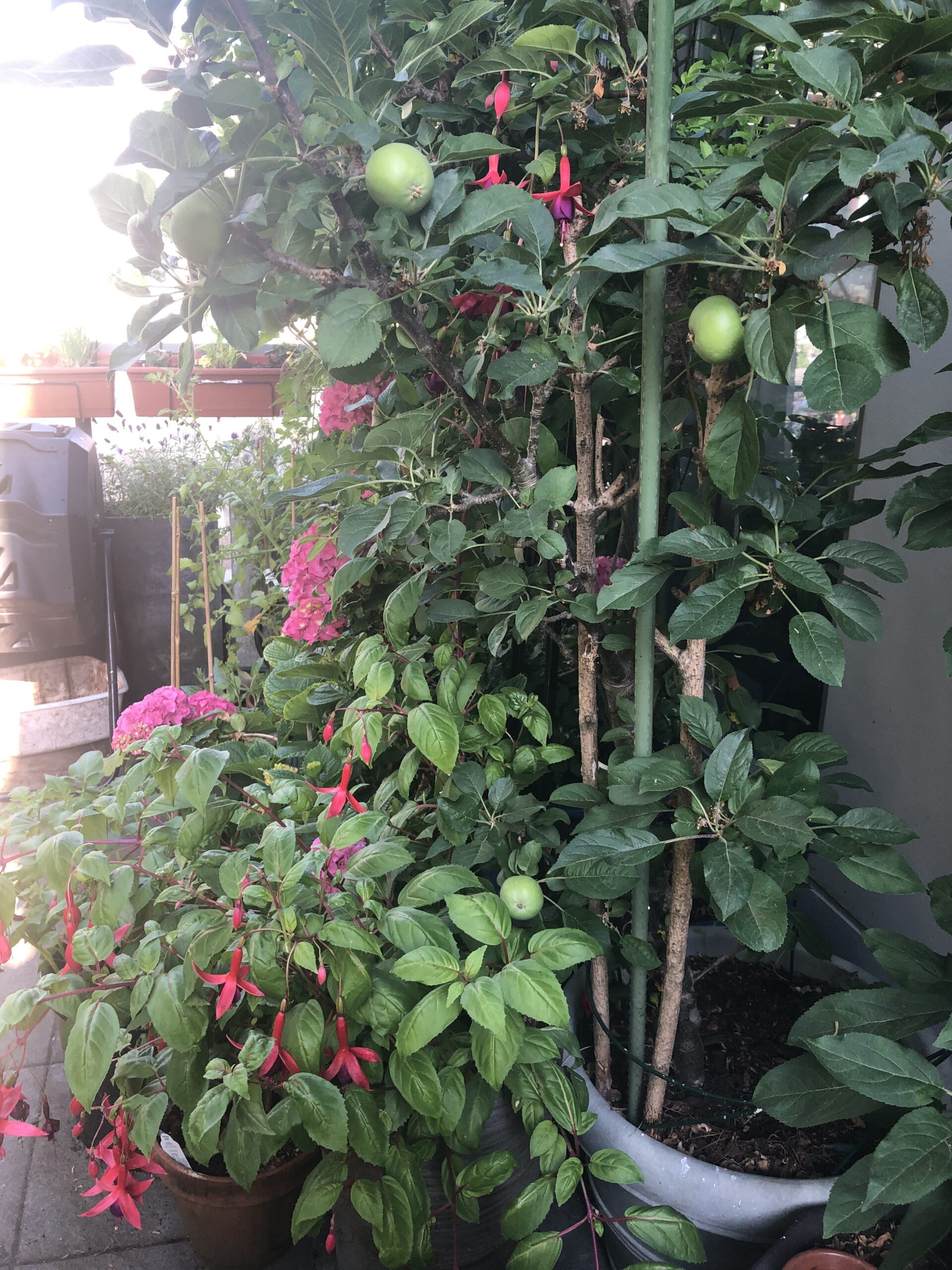
In ’71, my grandmother would have been moving into her late 80s after a lifetime of changes, large and small, and she still lived in the modest brick row house in which she and my grandfather had raised ten children. She still went outside to use the toilet, housed in a small shed in the backyard (and guests were helpfully provided with a porcelain chamber pot, for middle-of-the night needs). When she was cold, she’d still put a shilling in the gas meter to turn on the fire, and she’d do the same to heat up water for the upstairs bath. The rag-and-bone man still drove his horse and cart down the street regularly, calling out for scraps he’d been collecting for decades before “recycling” was mentioned in Mother Earth News.
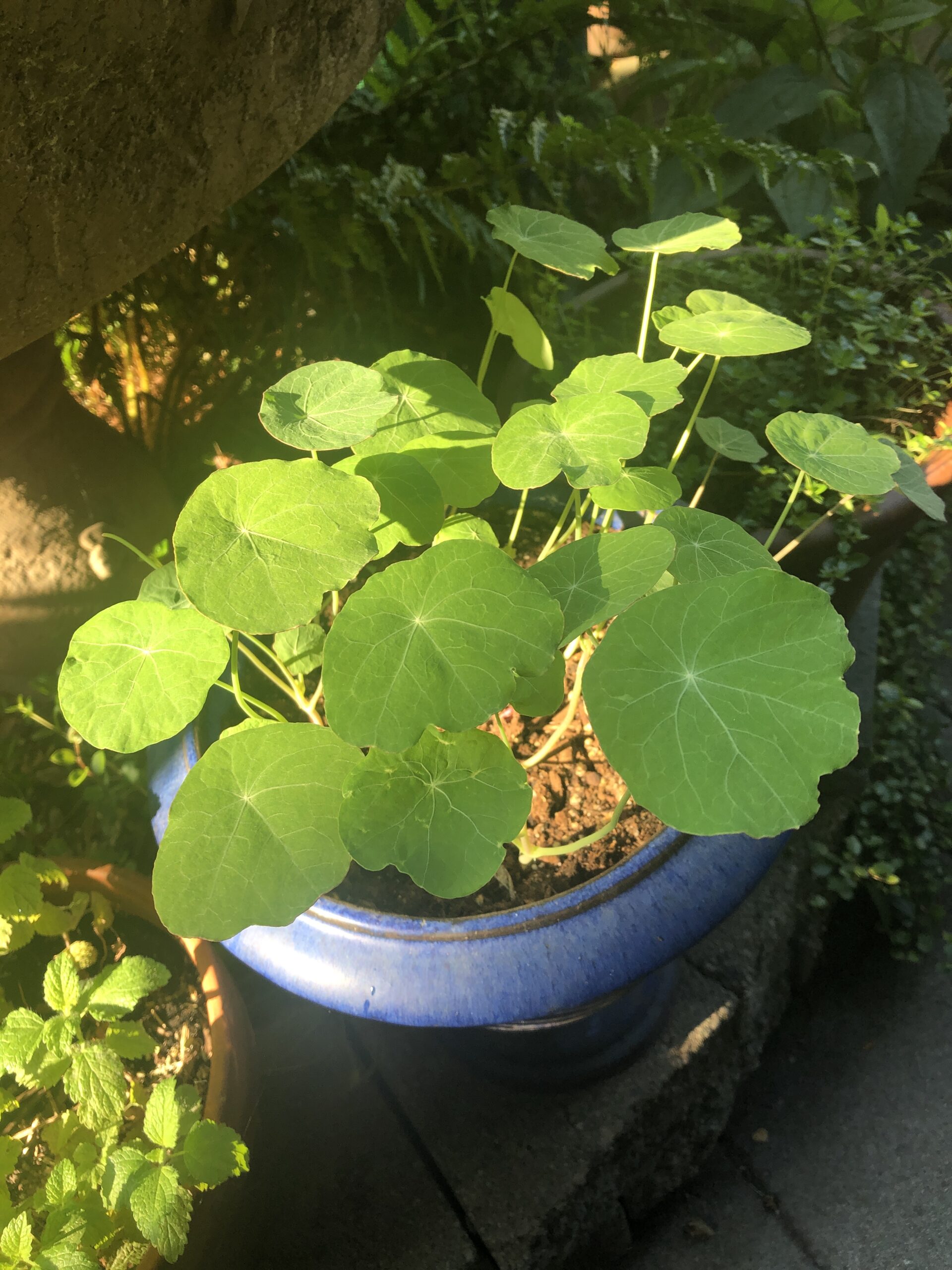
And apparently a few weeks before my sister and I arrived, my aunt had been up visiting my grandma, who’d passed along the news, “They’re changing all our money, Mary” before asking naïvely, “Are they changing yours too?” Even as I type her words, I hear them in my grandmother’s accent, her intonation, although I only ever heard them secondhand from my London auntie. As my aunt did then, I’ve always found them both hilarious and endearing. Now, over 50 years on (unbelievable!) I’m still 15 years younger than my grandmother was, but beginning to sense the discombobulation she might have been feeling at changes to something as foundational as a widespread change of currency. A change that wiped out a significant vocabulary with a wealth of connotations.
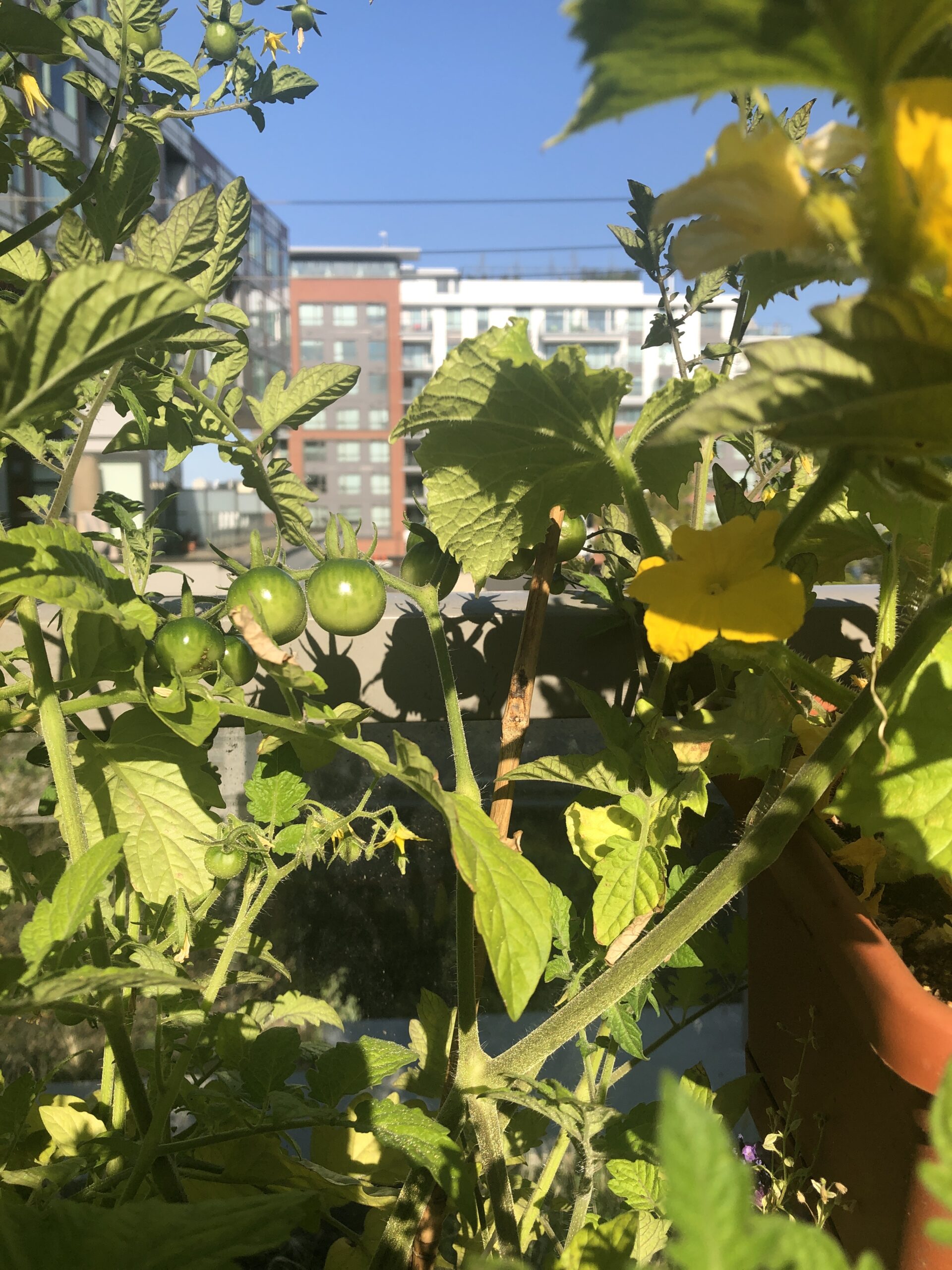
My grandmother was born 15 years before the 20th century began, and my English grandfather a year or two before her; both my Canadian grandparents squeezed up closer to the new century, but were also born in the 19th. And this grandson of mine who doesn’t know what a penny was may very well live into the 22nd. So I can touch an incredible four centuries through loved ones I’ve known well. A stretch of five generations, only two short of the proverbial seven that Haudenosaunee (Iroquois) teachings want us to keep in mind as we work for a sustainable future.
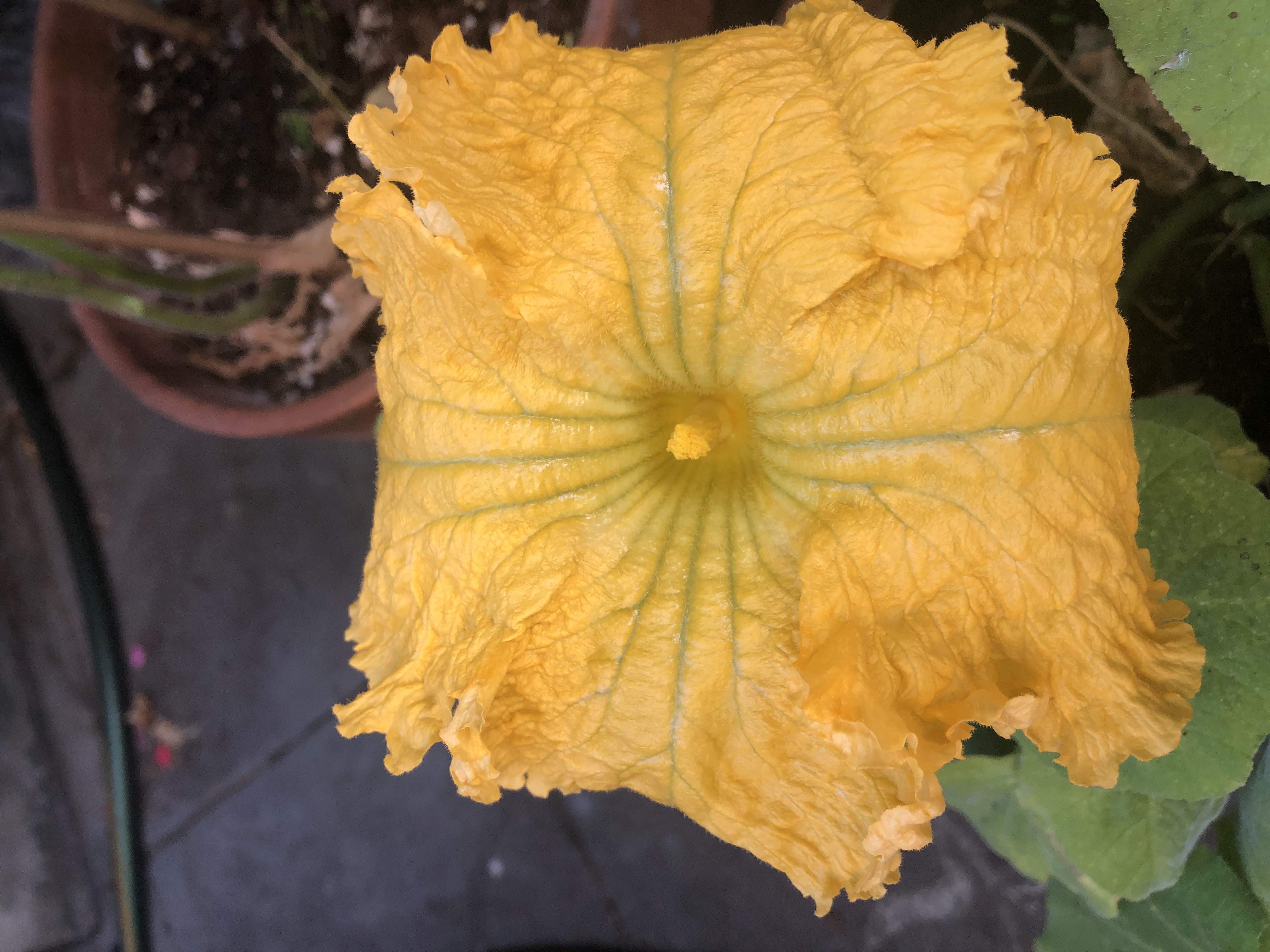
I suspect many of you can say the same, with grandparents born in the 19th century and grandchildren who may well live into the 22nd (if only we shift our focus from money and make some bigger changes to save their world).
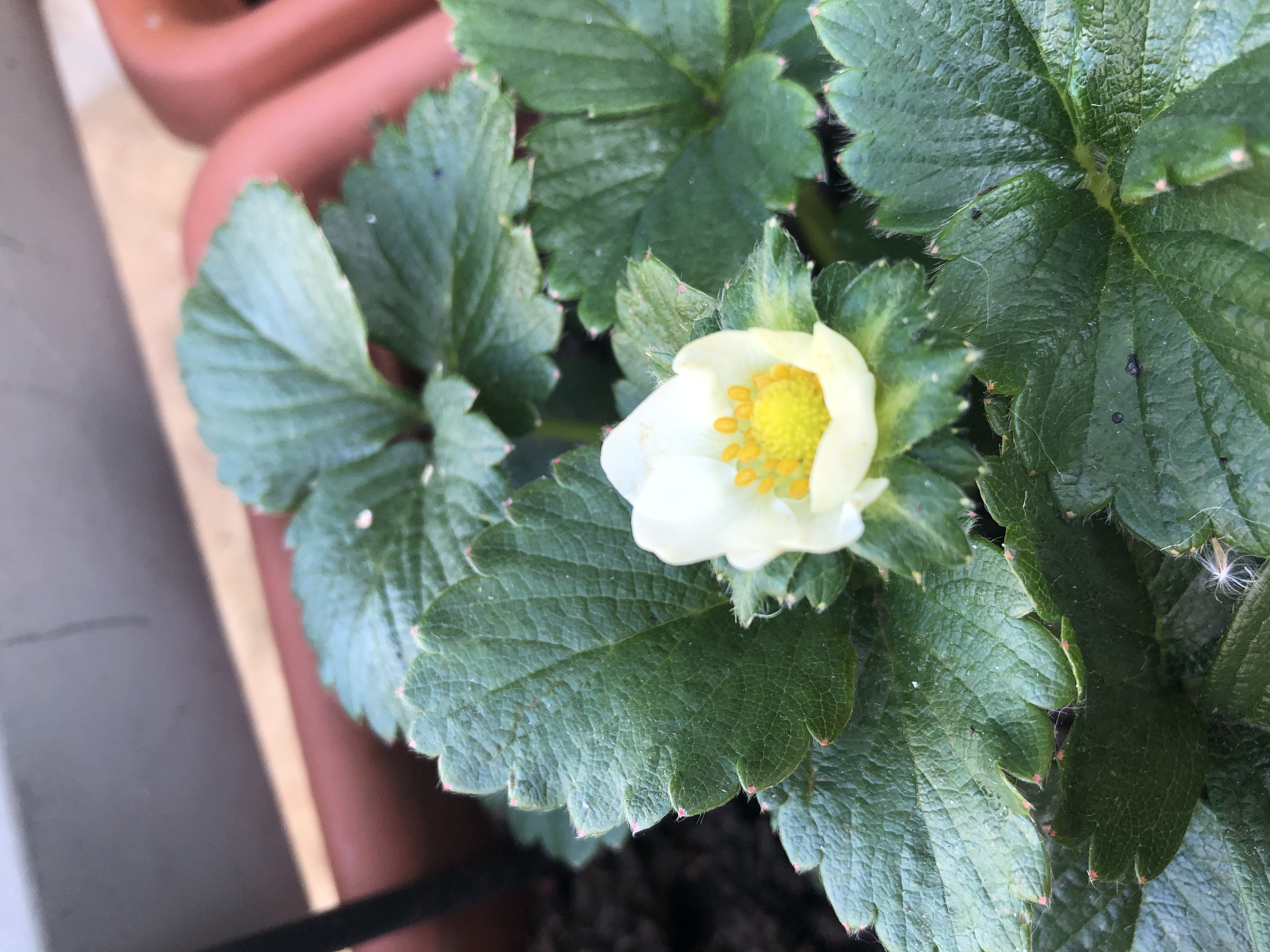
My “little story”‘s taken me further than I anticipated, to be honest, and I’ve momentarily reconsidered including the garden photos. But they took some time to get in place, and would take more to remove, so I think I’ll just leave them, and add a few words about the current state of our rooftop urban garden. After all, some connections can be made between a garden and my story of change, generations, and sustainability. The way a garden will teach us about resilience and continuity, the need to nurture, and the possibility of a cyclical rather than (or alongside) a linear perspective.
So a bit of garden time before I’m done. . . .
I know there are many gardeners among you (some of you might even remember the Garden Visit Series I hosted here several years ago), and I haven’t toured our rooftop terrace with you lately (most recent update was March, last year). Some of you have also been interested in our adjustment to condo life after having a seaside garden on a small island for many years (a few images of that garden in late June and mid-July). That adjustment (almost seven years now) has been eased considerably by being able to create the sense of a garden here, in limited space, several floors above the ground.
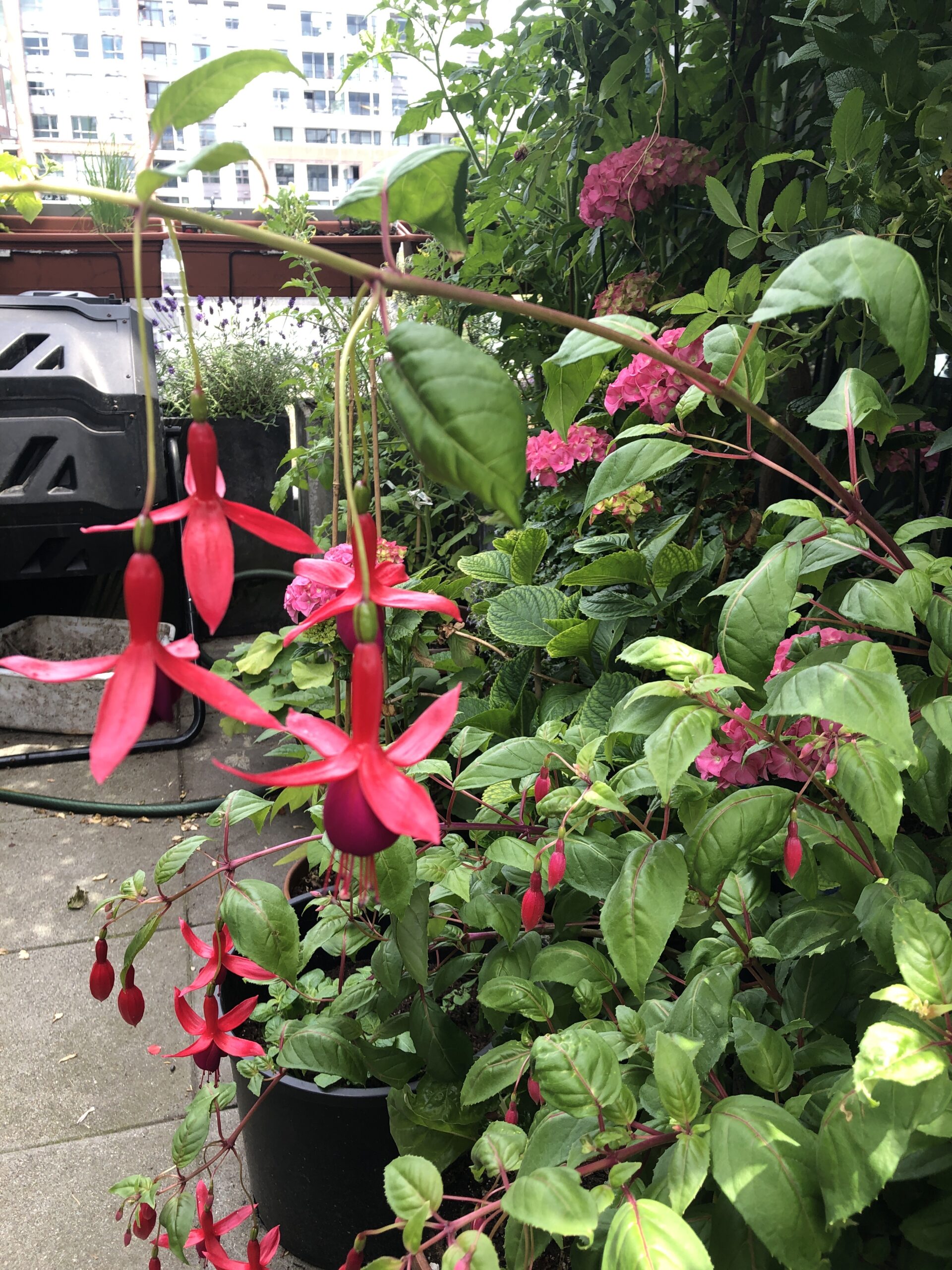
Last summer was a disaster for our container-grown trees (although I did harvest enough apples for my annual family Apple Pie Celebration), shrubs, and perennials, and we scarcely even tried with annuals. On top of the difficult weather, we had to move furniture and plants to accommodate a swing-stage for weeks-long maintenance work on the building’s envelope . . . and said swing-stage blocked our access to our terrace and made it very difficult to water and otherwise care for “the garden.”
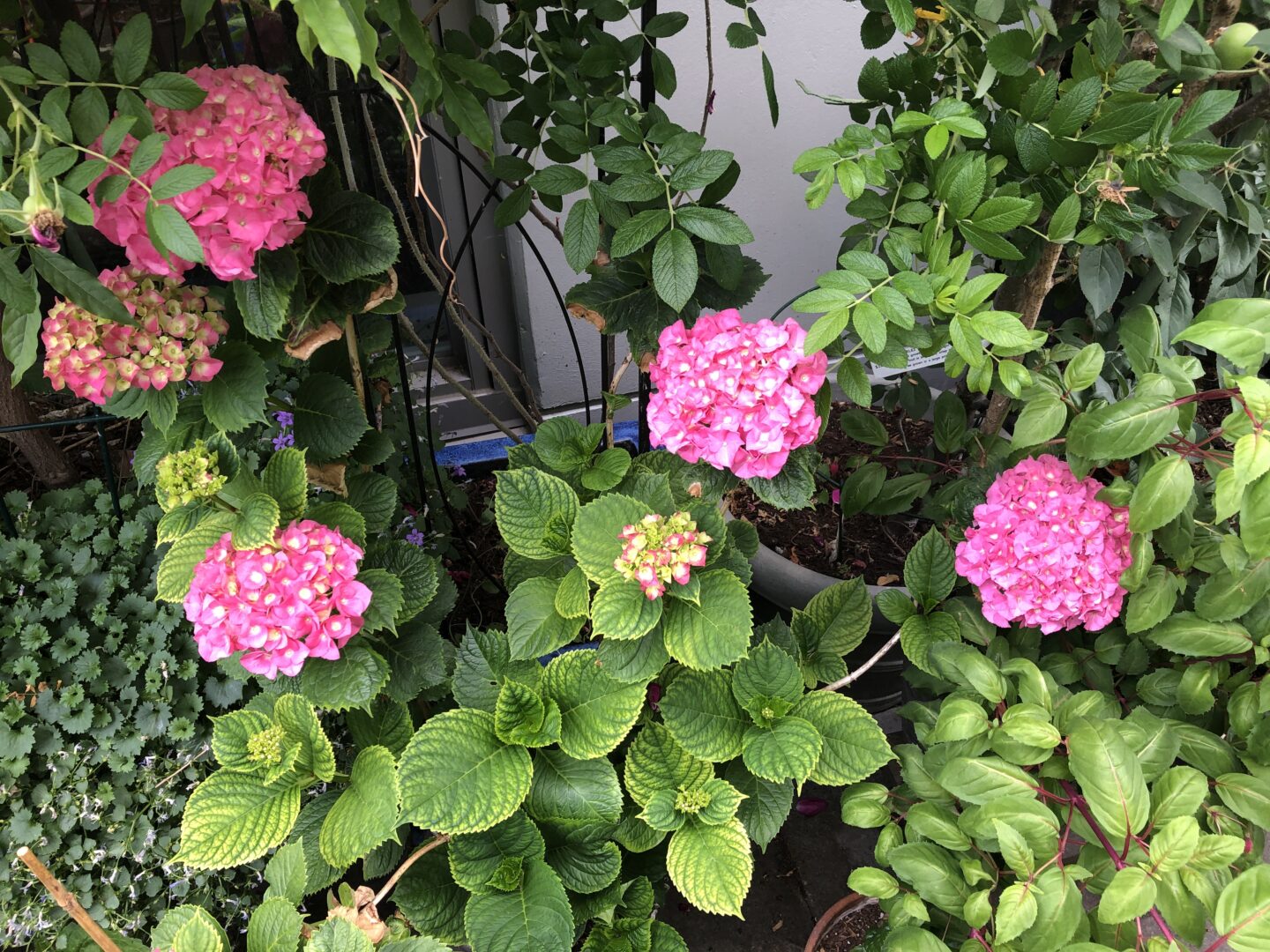
But we’ve replaced the plants that didn’t survive, moved some of the others, filled pots with veggies and herbs and annual blooms. Three apple trees are heavier with fruit than they’ve ever been — those mason bees have earned their keep! We’re eating pesto made from our own basil and parsley, and I love popping outside for thyme, oregano, or rosemary. Some evenings after dinner, instead of our usual Murchie’s Coconut Chai Roobos, Paul will snip some mint and brew it into a refreshing tea. . .
Maybe he’ll do that tonight. It’s a dinner-and-Netflix date — we’ve been watching Kim Cattrall and Miss Benny in Glamorous and thoroughly enjoying it. This kind of programming is a change I embrace wholeheartedly!
That’s it for now,
Looking forward to any comments you might leave,
xo,
f
I’m incredibly impressed with your balcony garden… so much better than we manage with much more space! Of course, there’s a vast difference in climate between there and here, but I also suspect that you put a lot of work into yours.
Author
Have to be honest — Paul does most of the work in the garden now. As he says, I’m the planner and he’s the labourer, although I’m more likely to deadhead or pull weeds.
Your rooftop garden is truly amazing! I am very impressed by what you have planted…
Your story reminded me of my Penny candy days :-))
Jawbreakers, double bubble and Thrills gums, candy cigarettes, and more!
Enjoy your Netflix “date night”…we’ll be watching George Gently on Acorn.
Such a lovely warm evening tonight.
Enjoy.
Author
It’s nothing like your fabulous garden, but it’s a great oasis here, thanks!
Ah, right, how could I have forgotten candy cigarettes. But that Thrills gum was not my favourite at all! 😉
I always love granny stories. I loved yours. My maternal grandmother was born in 1899. Mum always used to say that Grammy was a year older than the calendar. So I know that when I was born in 1956 she was 57. So easy to remember. I am now anticipating your next post. You have piqued my curiosity, and made me worry a little bit. I do hope all is well.
Author
My maternal grandmother and yours were almost the same age.
No, nothing to worry about, sorry for my phrasing or melodrama. Just trying to sort out some thoughts and feelings, as I’m wont! (insert eye-roll emoji)
Absolutely lovely photos and the family stories are beautiful.
Tangled up awkward feelings, unusually, summed up my day today. I hope everything is ok. Xx
Author
Pleased you enjoyed the post — I hope you were able to sort out those feelings and perhaps even let them go. Everything is okay here, but sometimes it takes a bit of working through, which is what I was doing. Small internal drama, nothing serious. x
what a beautiful garden you have created despite the Fates doing their best to thwart you. Question for you and your expert gardening reader friends – is there anything in my theory that the more lurid the blooms the harder the plant? In my inadequate experience brasher roots better.
And on decimalisation – back then it was all very exciting to have new coins to use for the bus to school and calling sixpence 2 1/2p felt like a triumph of modernity. Now I fear I’d be very, very irritated..
Author
Thanks, Ceri (I did feel a bit like shaking my fist at the skies and laughing, but yikes, tempting Fate, better not)
I’d agree with your theory, except then I remember some of those surprisingly sturdy plants whose performance belies their daintiness — Corydalis lutea is a longtime favourite, for example. . . .
Author
Also, I felt so pleased with myself, summer of ’67, visiting the relatives and sorting out your shillings and pence and ha’pennies and tuppence, etc. the 12s and the 20s to be divided and manipulated. . . .
Then in ’71, learning all that knowledge was outdated and recalculations were in order.
I’ve always loved the idea of connections across time. My grandparents, like yours, were born in the closing decades of the 19th century, and would have known some old people who were born in the late 18th or early 19th century. I do have some memories of my grandparents, and am glad you do too, but if only we could go back and ask all those questions that now spring to mind!
Author
Oh, all those missed opportunities, so many questions I’d ask now!
I was thinking about my maternal grandmother only last night, googling the residential home she was brought up in from (I think) age 7 to 14. It is gone now but some of the cottage homes are there, put to other use, and a modern housing estate has taken the space in the huge grounds. I think she was happy there with her sister and a brother but I cannot imagine how my great-grandmother felt, having to send three of her children into care. And how a little girl felt so far from home. Urban poverty at the end of the 19th century. As for decimalisation, I remember it very well. Hard to believe it was over half a century ago. Now I rarely use cash. Plus ca change etc.
Author
Oh yes, I’ve read about those cottage homes. So hard for your great-grandmother, as you say. We’d do well, perhaps, to remember that period’s urban poverty and shore up social support rather than allowing it to be whittled away . . .
And yes! That might be the biggest change of all, how rarely many of us use cash these days. . .
The stories about your grandmother and grandson are charming and affecting. I never met any of my grandparents and have no grandchildren, though that might change down the track, so the only centuries I’m connected to directly are the current and previous ones. I’m sure I’ve missed out by never knowing grandparents but I don’t really miss what I’ve never had. Your garden is an urban oasis and your photos are beautiful. Like you, I love to pick our herbs for cooking, and as it happens, tonight I picked the three herbs you mention, plus some parsley and mint to use in dinner tonight.
Author
Isn’t parsley such a satisfyingly luxuriant plant to grow! Nice to have that link in our dinners last night! 😉
In English class at school (in the 1960s) we were, of course, made familiar with the British currency, and I remember that many of my classmates were unable to imagine that one could do sums outside the decimal system. Our English teacher amazed us by summing up pounds, shillings, and pence with incredible velocity. When I went to London for the first time, in 1970, I was given luncheon vouchers worth 3s6d in compensation for my volunteer work. When I went back next time, all the old coins and names had gone, and I felt quite sad.
The biggest change in this country, with respect to money, has certainly been that from Mark to Euro. And even though we have kept to a decimal system, quite a few words have disappeared. There were popular names for certain coins (e.g. the ten-Pfennig-coin) or notes, which have not been transferred to the Euro. And I doubt that new names will develop, because, as has been noted here, cash is being used less and less.
Author
So much is tied up with currency, so many links and connotations and sensory memories and accoutrements (little coin purses which were quite necessary when visiting Europe, especially, only five or ten years ago, are quickly becoming redundant).
I don’t know how those who beg for coins (or bills, even) on the street can manage anymore — I so rarely have any change with me. A local project sells and often donates vouchers which can be exchanged for a choice of sandwiches, but they’re not received as happily as coins were.
I still do most of my shopping with cash, because it is the only way to avoid all my transactions being filed in some data bank or other. I prefer the anonymity that cash provides. And an additional advantage which you pointed out: I always carry change for tips or for people who beg in the street or (more often) in the train station.
Feeling some nostalgia here. Remembering when I had a 25 cent allowance, so many choices available, a cherry Coke at Trotta’s Pharmacy, the penny candy store, candy cigarettes or those little wax bottles with the sweet stuff inside, and Mary Janes. If I was frugal and saved up there were all kinds of cool trinkets at Polk’s 5 and 10 cent store down town. Really dating myself here.
Your garden is impressive! I have had success myself with my herbs, just made my first batch of pesto of the season, and my neighbor was happy to see all my thyme which she planned to use for her chicken soup. The petunias, once a lush riot of color seem to have quit, so than plan for today will be to seek replacements.
Author
Oh, yes! What we could do with that 25c allowance!
Isn’t it great to make pesto from your own basil?! Or plucking a few leaves for a simple open-faced sandwich of olive oil, tomato slices, salt, and basil….
Since my parents were in their 40s when I was born, all my grandparents were born in the 19th century (1860s/1870s) in England (2), Scotland (1) and Ireland (1). Only knew my maternal grandmother as the others all died long before I was born. She died in London in 1960 at the age of 83. I attended her funeral which involved a horse-drawn, windowed black hearse–the horse wearing large black plumes. Having grown up in London myself, I still remember many of the things your Yorkshire grandmother recalled. My aunt/uncle’s homes in London did not have indoor plumbing until the mid-1960s–I always dreaded needing to use their loos as it involved traipsing into the back of the property–always seemed to be freezing–to access the dank small shed and having to use the waxed toilet paper sheets that one had to rub together to make soft enough not to injure oneself.
Having grown up with pounds, shillings and pence (and terms as you mentioned along with ten bob, 2s/6p, a quid), it was a bit of a rude shock when the UK went to the decimal system. I still have the Royal Mint memorial packets my father bought–one with the old coins and one with the new. I’ve always kept a sixpence on hand–specifically for the shoes of all the family brides. As for the lowly (British) penny, well, I still remember when any reference to going to the bathroom when I was growing up was preceded with the comment, “I must go pay a penny.” Most public restrooms in London at the time required that large brown coin to be inserted in the door dispenser in order to access a loo. 🙂
Author
Wow! I’d want to hover over my deceased body just to watch myself being drawn by horses wearing plumes! That’s a real funeral!
I remember that toilet paper. . . not with fondness 😉
My Dad used to use that expression — “D’you have to go spend a penny?” I remember the penny dropping (ha!) for me when I visited England in ’67 and had to dig in my change-purse to use a toilet. So many places in Europe where you still do have to pay, but it’s far more than a penny now, and last time I used one in the huge mall beneath a huge train station, there was a line-up of people trying to figure out how to use a card for the turnstile because they had no change.
The funeral carriage was actually quite beautiful. However, it was my first experience of death and I was less thrilled with the fact that before the funeral I was brought in to see my Nan’s unembalmed body which was wrapped in a shroud–only her face showing–and laid out in a wooden casket on two sawhorses in my Aunt’s second bedroom (my boy cousins’ bedroom–which I never again entered after that day.) A not-so-happy memory I still retain. No such thing as funeral homes back then in London–at least for the less wealthy.
Not sure how well I’d have travelled through the dark times of these last few years without my potted garden reconnecting me to the seasons, the light, the birds. I can imagine the joy your rooftop oasis brings as you start each day. Your photos are always inspiring.
Author
Growing things! Makes such a difference . . . especially when the plants bring the birds. Even the little English sparrows delight me some days. . .
That is a lovely story about your grandmother. And what a mind-whirling span of generations! 1971 was when I went to secondary school, and very grateful indeed to have got rid of shillings, half crowns and guineas, etc. Maths was hard enough for me as it was without having to count in 12s. I remember converter tables being issued with newspapers, and every household seemed to have its “decimal currency” tea towel with images of the new currency. I’ve inherited quite a collection of old pennies, which were large compared to our later versions. Worn smooth with use – I think the oldest is dated 1916. I also have 12-sided thruppeny bits (three pence) handed down, and silver sixpences. Coins were much more interesting then!
France went through its own redenomination of the franc in 1960. When I spent my assistantship year in France in 1979-80, the old currency was still in people’s scale of values. I was very confused at first by older people quoting astronomical sums for basic items. But they usually qualified which currency they were referring to. “j’ai payé 10 mille balles – anciens”. “ça fait 100 balles – nouveaux”. It was usually “balles” too, not “francs”.
Container gardening is a real and distinct gardening skill. You’ve had a lot to contend with given the building work, but you seem to be getting into your stride.
Tour de France highlights on TV tonight for me. Planning to record all of Friday afternoon’s coverage, when the Tour arrives in Bordeaux.
Author
I’ve seen that reference in books to “old francs” and “new francs” — hadn’t heard of “balles”
I’m finding it so interesting now to recognize how much we lose and much we see for the first time even in the relatively short span of our life (short in the context of history, that is)
I moved to Paris the year before the transition to the euro, and those first few years were similarly confusing. Older friends now navigate euros in everyday life, but big-ticket items (cars, houses, indulgent vacations) still have to be translated into francs to give a true sense of the magnitude of the expenditure. And it took a while, but “balles” eventually carried over to the euro, too.
Mum would hand each of us a ‘ threpenny ) bit each morning to call at the sweet shop outside the school . It was the tiniest shop & very dark . The lady in charge was called Florrie Mudd , a well known local character who always seemed quite tattered & worn out . She was getting on , & having a noisy hoard of schoolchildren crammed into her small space for about 30 minutes every morning must have been exhausting. The sweet rationing of my early childhood made them seem especially attractive & my sugar addiction began . All under control now . We needed sugar then . Post war Britain was a grey place , with outside toilets ( newspaper was our toilet paper ) , no central heating ( ice on the inside of the windows ) , tin baths in front of the fire . On the plus side we were free & safe to wander the countryside without our parents worrying .
Your garden in the sky is lovely . Everything looks so healthy & pest free , do greenfly etc not fly that high ?
Author
That’s such a big change, itself, adult approval of sweets for children, and it makes sense in the context of the preceding rationing. My English relatives made sure that I was taken into the shop at the corner where my Dad had been a regular, picking out his sweets as a little guy. He was so pleased to know that I’d said hi to Dot and she’d sent her love. So sweet! (sorry 😉
As for the garden pests, we do have them, probably brought home from the nursery as hitch-hikers. And it’s harder, of course, to get an eco-system that balances itself out with natural pest controls. On the other hand, it’s much easier to isolate or to replace problem plants, and we’re less tolerant if something’s not doing well (I tend to urge another year of nursing; Paul’s generally skeptical and then often pleasantly surprised).
100% applauding the pun. And as a historian, really appreciating the very personal sense of historical change in your grandmother’s story. This is one of the hardest things to convey to college students, who at 18-21 don’t have enough of a sense of time to understand that feeling of a world becoming foreign that you describe (and I feel ever more sharply myself at almost-fifty). Thank you for sharing.
Author
Thanks for the pun appreciation! 😉
So true what you say about college students. That’s who I taught for years, as well — not history, but often fiction or non-fiction either written or alluding to the past — and I also vaguely remember myself, and then my own kids and their friends at that age. The previous century can seem so remote, especially its farthest edge. But it’s not so many human lifetimes away, is what I see now . . .It’s important work you do, getting your students to comprehend that, to imagine their way back. . .
First: you have beautiful feet!
Second: greetings from Zagreb, where we are stopping for two days before going further to the coast of Croatia!
I did enjoy the currency pun. Funny to think about currency changing. We still have pennies in the US and most people don’t like them. They are often thrown into the street. That can be a problem for walkers like me and my husband who grew up with the saying, “Find a penny, pick it up. Then all day you’ll have good luck.” It feels like bad luck to leave it on the ground once it is seen.
Your garden is lovely. Thank goodness for container gardening. I’m amazed that you have apple trees with apples on them! In pots? I’d love more details. How big are the pots?
Last winter was a hard one for our plants that were in the ground. We had a couple of very cold spells without snow and lost some things, our beautiful butterfly bush for one. In Arlington, MA, our azaleas didn’t bloom this spring and we don’t have any blooms on most of our hydrangeas yet. Not sure if we will have blooms.
Speaking of hydrangeas, I love the bright pink one! How exciting that you created it from a cutting. Wouldn’t it be nice if we were all close enough to have a cutting club?
I have a few new hydrangeas that are white. They are called Wedding Gown and have both lacy and solid petals. They are very elegant. I have had several blue hydrangeas and I’m enjoying the addition of these white ones. Your pink one is calling to me. I may need to add one.